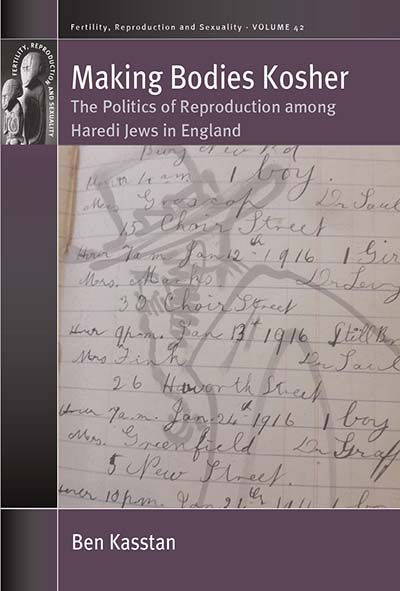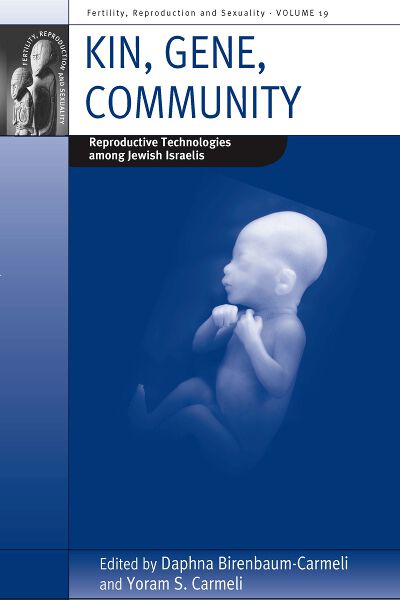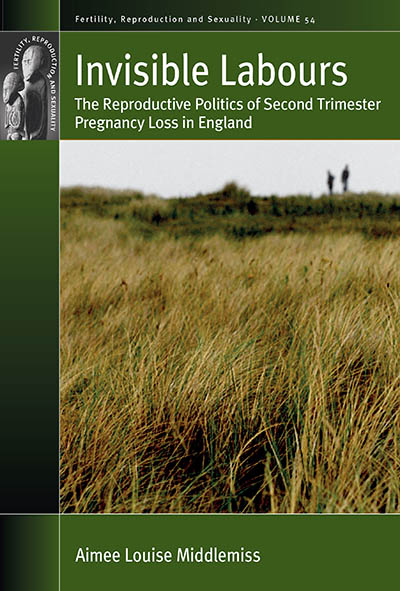
Series
Volume 42
Fertility, Reproduction and Sexuality: Social and Cultural Perspectives
See Related
Anthropology JournalsEmail Newsletters
Sign up for our email newsletters to get customized updates on new Berghahn publications.
Making Bodies Kosher
The Politics of Reproduction among Haredi Jews in England
Ben Kasstan
Full Text PDF | Full Text ePUB Made available under a CC BY-NC-ND 4. license with support from Wellcome Trust.
286 pages, 17 illus., bibliog., index
ISBN 978-1-78920-228-1 $135.00/£104.00 / Hb / Published (June 2019)
ISBN 978-1-80073-720-4 $19.95/£15.95 / Pb / Published (September 2022)
Reviews
“[This] commendable ethnography helps us to appreciate that, far from being given, marginality is the effect of concrete state practice, whose domain extends well beyond public health education campaigns.” • Journal of the Royal Anthropological Institute
“…an important contribution to the Berghahn series on Fertility, Reproduction and Sexuality and should be essential reading for medical anthropologists in the wake of the pandemic.” • Medical Anthropology Quarterly
“A successful juxtaposition of the history of medicine, Jewish Studies and medical anthropology, Making Bodies Kosher re-assesses sweeping categorisations of enthnoreligious minorities and their complex relationships to public health interventions and health care. This attentive and innovative work will appeal to social historians of medicine, Jewish Studies scholars and women’s and gender studies scholars. Public health and medical professionals could also utilise this work to evaluate their assumptions about health, religion and ‘non-compliance’.” • Social History of Medicine
“Overall, this is an accessible, interesting and fluently written book which is a useful and timely addition to the literature in this area. Making Bodies Kosher will prove a valuable resource to those engaged in medical humanities.” • Medical Humanities
“Kasstan’s objective was achieved through an innovative use of theory and a deep attention to detail and sensitivity for his interlocutors…The richness of this ethnography cannot be understated and serves as a valuable introduction for public health practitioners tasked with the challenge of addressing larger issues of health disparities that result for faith-based groups…Research has demonstrated the challenges of engaging faith-based groups with clinical trials and this work not only supports those findings, but also serves to provide valuable insight for overcoming those challenges.” • Sociology of Health & Illness
“The impactful nature of Kasstan’s ethnography on the discourse of medical anthropology and Jewish studies more broadly cannot be underestimated, particularly during a time when a global pandemic is having far-reaching social, political and economic impacts on minority populations. Making Bodies Kosher not only problematises largely taken-for-granted rhetoric surrounding minority ethno-religious people but urges the public health sector to reflect on how these misinformed ideas can exacerbate inequities within the system. Further, its timely nature and accessible analysis make it a must-read ethnography for those concerned with ethnoreligious minorities, culturally specific healthcare and Jewish studies more broadly.” • The Australian Journal of Jewish Studies
“The fields of Jewish studies, medical anthropology, and the anthropology of reproduction will benefit significantly from Making Bodies Kosher. Moreover, public health experts would do well to heed the critique Kasstan has offered in order to provide better care to minority groups around the world.” • The Polyphony
“Kasstan’s writing offers a fine weave of historical and contemporary ethnographic data and is clear and accessible. It will be a valuable teaching and learning resource… The book offers an important theoretical resource.” • Kaveri Qureshi, University of Edinburgh
“This is a clear and engagingly written account of the experiences of Haredi Jews in the UK…this account stands to be an important contribution to medical anthropology and anthropology of religions.“ • Sallie Han, SUNY Oneonta
Description
Minority populations are often regarded as being ‘hard to reach’ and evading state expectations of health protection. This ethnographic and archival study analyses how devout Jews in Britain negotiate healthcare services to preserve the reproduction of culture and continuity. This book demonstrates how the transformative and transgressive possibilities of technology reveal multiple pursuits of protection between this religious minority and the state. Making Bodies Kosher advances theoretical perspectives of immunity, and sits at the intersection of medical anthropology, social history and the study of religions.
Ben Kasstan is a medical anthropologist in the Department of Global Health and Development at the London School of Hygiene and Tropical Medicine.
Subject: Medical AnthropologyJewish StudiesAnthropology of Religion
Area: Northern Europe
Making Bodies Kosher by Ben Kasstan is available open access under a Creative Commons Attribution-NonCommercial-NoDerivatives 4.0 International License (CC BY-NC-ND 4.0) with support from Wellcome Trust.
Full Text PDF | Full Text ePUB
OA ISBN: 978-1-78920-230-4



